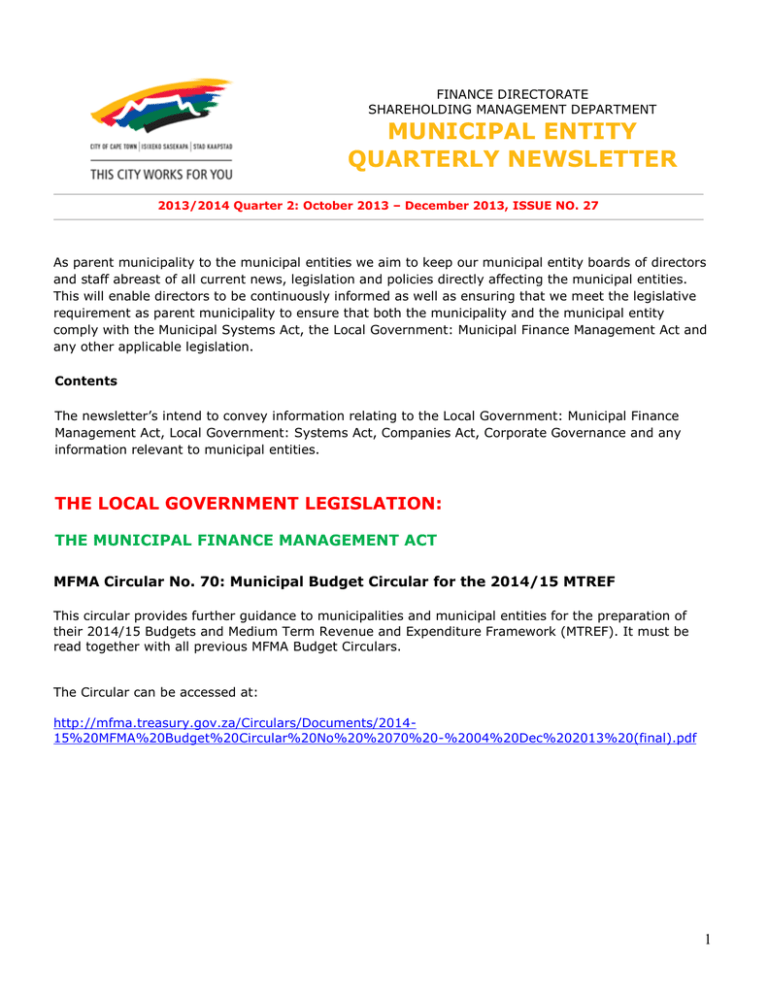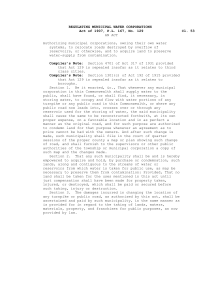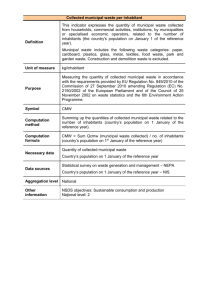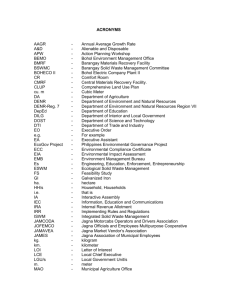
FINANCE DIRECTORATE
SHAREHOLDING MANAGEMENT DEPARTMENT
MUNICIPAL ENTITY
QUARTERLY NEWSLETTER
Analyst
2013/2014 Quarter 2: October 2013 – December 2013, ISSUE NO. 27
As parent municipality to the municipal entities we aim to keep our municipal entity boards of directors
and staff abreast of all current news, legislation and policies directly affecting the municipal entities.
This will enable directors to be continuously informed as well as ensuring that we meet the legislative
requirement as parent municipality to ensure that both the municipality and the municipal entity
comply with the Municipal Systems Act, the Local Government: Municipal Finance Management Act and
any other applicable legislation.
Contents
The newsletter’s intend to convey information relating to the Local Government: Municipal Finance
Management Act, Local Government: Systems Act, Companies Act, Corporate Governance and any
information relevant to municipal entities.
THE LOCAL GOVERNMENT LEGISLATION:
THE MUNICIPAL FINANCE MANAGEMENT ACT
MFMA Circular No. 70: Municipal Budget Circular for the 2014/15 MTREF
This circular provides further guidance to municipalities and municipal entities for the preparation of
their 2014/15 Budgets and Medium Term Revenue and Expenditure Framework (MTREF). It must be
read together with all previous MFMA Budget Circulars.
The Circular can be accessed at:
http://mfma.treasury.gov.za/Circulars/Documents/201415%20MFMA%20Budget%20Circular%20No%20%2070%20-%2004%20Dec%202013%20(final).pdf
1
LOCAL GOVERNMENT: MUNICIPAL SYSTEMS ACT
Code of Conduct
The Systems Act sets out a Code of Conduct for directors and staff which must be complied with. A full
copy Code should be available from the Company Secretary. An example of what the Code contains is
repeated below:
11.
Intervention in administration.—A director may not, except as provided by law—
(a) interfere in the management or administration of any department of the municipal entity unless
mandated by the board of directors;
(b) give or purport to give any instruction to any employee of the council except when authorised to do
so;
(c) obstruct or attempt to obstruct the implementation of any decision of the board of directors or a
committee or by an employee of the municipal entity; or
(d) encourage or participate in any conduct which would cause or contribute to maladministration in
the municipal entity.
12. Municipal entity property.—A director may not use, take, acquire or benefit from any property or
asset owned, controlled or managed by the municipal entity to which that director has no right.
12A. Directors in arrears.—A director may not be in arrears to the municipality for rates and service
charges for a period longer than 3 months.
DEPUTY FINANCE MINISTER Andries Nel's Remarks on International Anti-Corruption
Day
"As we mourn the passing of former President Nelson Mandela, we recall the intense passion with which he hated and fought
corruption in all its manifestations. It is, therefore, important that we act strongly against corruption.
The public demands that we maintain the strictest standards of honesty and integrity. If not, as Alexander Pope prophesied, a
general deluge shall flood all and avarice would creep on and spread like a low-born mist that blocks out the sun.
The UN General Assembly declared 9 December as International Anti-Corruption Day to raise awareness of corruption and a need
to prevent it. This followed the adoption of the United Nations Convention against Corruption in 2003.
South Africa is a signatory to this Convention which came into effect in December 2005. Corruption undermines democratic
institutions, slows down economic development and can lead to instability. It is an assault on the foundation of democracy and the
rule of law.
The impact of corruption on local government is worrying because the vision of a developmental local government is central to
achieving the objectives of the National Development Plan.
Many municipalities lack confidence because the expectations placed on them exceed their administrative and financial capabilities.
This has contributed to the wrong and very destructive perception that local government is an unmitigated and irredeemably corrupt
sphere of government.
2
Recently, the ministers of Cooperative Governance and Traditional Affairs (CoGTA), National Treasury and Public Service and
Administration announced strong measures to build a capable developmental state and fight corruption in line with
recommendations of the National Development Plan (NDP).
Early in 2014, CoGTA minister will gazette regulations to set enforceable competence standards for municipal managers
and senior officials accountable to them.
These measures are a direct response to challenges where persons are appointed in municipalities without the relevant
skills, expertise and qualifications.
They will also reflect government’s resolve to professionalise local government as right skills are critical to municipal
effectiveness.
The use of a competence-based approach in recruiting senior managers, in particular, will:
reduce turnover and increased performance of senior managers and their teams;
to fighting corruption by creating an environment in which better financial management and controls can be applied
fight corruption by preventing re-employment of officials who had been dismissed from another municipality for certain
categories of serious misconduct. These individuals can remain blacklisted for employment in local government for a
period of between two to 12 years. The regulations will further make provisions senior municipal officials to be prevented
from working in local government for ten years if they are found guilty of fraud or corruption.
The department is currently developing an online database or case-management system that will require municipalities to
register cases of misconduct.
All municipalities will in future be requested to use the data before they finalise their appointment of municipal officials.
Whilst these and other regulations are necessary, the national government needs an enabling framework that focuses on
developing the systems to strengthen local government.
In line with this approach, the minister of finance published the draft municipal regulations on standard chart of accounts in
September in line with the Municipal Finance Management Act (MFMA). Currently, each municipality manages and reports on its
financial affairs using its own organisational structure and chart of accounts.
The result is a disjuncture, amongst municipalities and municipal entities and between municipalities and the other spheres of
government, as to how they classify revenue and expenditure and report thereon. This compromises transparency, reliability and
accuracy of the planning and reporting processes.
The regulations will bring greater uniformity and result in an improved understanding of the role of local government in the broader
national policy framework and linkage to other government functions.
The minister of Public Service and Administration has also announced measures, at national and provincial levels, that would
prohibit officials from doing business with government and establish a national school of government.
The past week saw the release of Transparency International’s Corruption Perception Index for 2013. The Index ranks
countries or territories based on the perception of their public sector.
3
Whilst corruption affects all countries, it has a disproportionate impact on developing countries.
It is interesting then to locate South Africa in the context of its peers - the BRICS countries (Brazil, Russia, India and China).
According to the index:
South Africa and Brazil ranked at 72 out of 177 countries surveyed with scores of 42 out of 100.
China was ranked at 80 with a score of 40.
India ranked at 94 with a score of 36.
Russia ranked at 127 with a score of 28.
Despite the progress we have made, the road ahead is still long. Former President Mandela’s proclamations at the launch of the
National Crime Prevention Strategy in 1999 still apply to our ongoing fight against corruption.
He said: “We are long past blaming all our difficulties on our past. But it is at our peril that we ignore the roots of South Africa’s high
levels of crime in the apartheid era. It left us with a justice system pervaded with lawlessness and criminality. It corroded the moral
fabric of our society. It`s legacy of poverty will take years to eradicate. For all these reasons our fight against the unacceptable
levels of crime must be a many-sided one and have the active participation of every sector of society”.
GENERAL LEGISLATION
EMPLOYMENT TAX INCENTIVE ACT, 2013
This Act, which comes into effect on 1 January 2014, will encourage private employers to employ
young workers by providing a tax incentive to employers, with government sharing the costs of such
employment for a maximum of two years under certain conditions. This tax incentive can also be used
to provide jobs to the many matriculants and other school leavers who will be entering the labour
market.
Unfortunately, municipalities and municipal entities do not qualify as eligible employers as
contemplated in section 3 of the Act –
“An employer is eligible to receive the employment tax incentive if the employer—
(a) is registered for the purposes of the withholding and payment of employees’
tax by virtue of paragraph 15 of the Fourth Schedule to the Income Tax Act;
and
(b) is not—
(i) the government of the Republic in the national, provincial or local
sphere;
(iii) a municipal entity defined in section 1 of the Local Government:
Municipal Systems Act, 2000 (Act No. 32 of 2000);”
4
PROTECTION OF PERSONAL INFORMATION ACT, 4 of 2013
The President has assented to the Protection of Personal Information Act, and the Act will come into
effect on a date still to be determined.
“The Act aims to give effect to the right to privacy, by introducing measures to ensure that the
personal information of an individual (data subject) is safeguarded when it is processed by responsible
parties. The Act also aims to balance the right to privacy against other rights, particularly the right of
access to information, and to generally protect important interests, including the free flow of
information within and across the borders of the Republic.”
THANK YOU:
On behalf of the City, the Shareholding Management Department would like to thank all the staff and
board members of the City’s municipal entity for their contribution and commitment during 2013. We
look forward to working with you in 2014.
Please contact Louise Muller (021 4003940) or Richard Wootton (021 4002701) if you have any queries
in respect of this newsletter.
Although every effort is made to check the accuracy and quality of the information supplied, The City
cannot be held responsible for any errors that may arise.
Copyright: City of Cape Town 2013. All rights reserved. No part of this newsletter may be reproduced or transmitted in any form without
written permission from the City of Cape Town, Finance Directorate, Shareholding Management Department.
5







